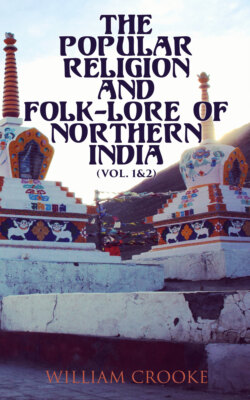Читать книгу The Popular Religion and Folk-Lore of Northern India (Vol. 1&2) - William Crooke - Страница 6
На сайте Литреса книга снята с продажи.
ОглавлениеAmong all the great religions of the world there is none more catholic, more assimilative than the mass of beliefs which go to make up what is popularly known as Hinduism. To what was probably its original form—a nature worship in a large degree introduced by the Aryan missionaries—has been added an enormous amount of demonolatry, fetishism and kindred forms of primitive religion, much of which has been adopted from races which it is convenient to describe as aboriginal or autochthonous.
The same was the case in Western lands. As the Romans extended their Empire they brought with them and included in the national pantheon the deities of the conquered peoples. Greece and Syria, Egypt, Gallia and Germania were thus successively laid under contribution. This power of assimilation in the domain of religion had its advantages as well as its dangers. While on the one hand it tended to promote the unity of the empire, it degraded, on the other hand, the national character by the introduction of the impure cults which flourished along the eastern shores of the Mediterranean.1
But, besides these forms of religion which were directly imported from foreign lands, there remained a stratum of local beliefs which even after twenty centuries of Christianity still flourish, discredited though they may be by priests and placed under the ban of the official creed. Thus in Greece, while the high gods of the divine race of Achilles and Agamemnon are forgotten, the Nereids, the Cyclopes and the Lamia still live in the faith of the peasants of Thessaly.2 So in modern Tuscany there is actually as much heathenism as catholicism, and they still believe in La Vecchia Religione—“the old religion;”—and while on great occasions they have recourse to the priests, they use magic and witchcraft for all ordinary purposes.3
It is part of the object of the following pages to show that in India the history of religious belief has been developed on similar lines. Everywhere we find that the great primal gods of Hinduism have suffered grievous degradation. Throughout the length and breadth of the Indian peninsula Brahma, the Creator, has hardly more than a couple of shrines specially dedicated to him.4 Indra has, as we shall see, become a vague weather deity, who rules the choirs of fairies in his heaven Indra-loka: Varuna, as Barun, has also become a degraded weather godling, and sailors worship their boat as his fetish when they commence a voyage. The worship of Agni survives in the fire sacrifice which has been specialized by the Agnihotri Brâhmans. Of Pûshan and Ushas, Vâyu and the Maruts, hardly even the names survive, except among the small philosophical class of reformers who aim at restoring Vedism, a faith which is as dead as Jupiter or Aphrodite.
